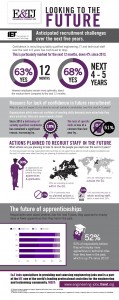Looking to the Future of Engineering Recruitment
Each year the Institution of Engineering and Technology (IET) conducts a survey to track recruitment trends among 400 major engineering and IT employers.
Whilst engineering in the UK continues to go from strength to strength and it’s predicted to be a cornerstone of UK growth over the coming years as outlined in the 2014 Budget, this year’s annual survey has revealed growing concern at the lack of suitably qualified engineering staff.
The Skills Gap
The majority (59%) of respondents perceive that a shortage of engineers would pose a threat to their business in the UK, and whilst most respondents were confident that they would be able to recruit the staff they need, this figure has continued to drop, with 4% less confidence of hiring over the next 12 months compared with 2013.
In terms of the cause of this change, the proportion of respondents that pointed to a deficiency of suitably qualified candidates increased by 18%. This is stark contrast to those who blamed a lack of specific skills, which plummeted by 51% on 2013. For the 9th year running, employers have also been dissatisfied with the numeracy and literacy of school leavers and the lack of leadership skills and technical expertise of graduates.
The implication inferred from these responses is that difficulty in finding the right candidates is rooted in generalist rather than specialist skill, with experience, leadership and literacy being the most common shortfalls. This suggests a downturn in the quality, as well as number of graduates.
The Response of Employers
The response from employers to the perceived gap in skills has been varied. However, the main thrust of the response over the next 4-5 years is to either look for talent outside the UK or to try to further develop graduates and apprentices internally. This second approach is reflected in the proportion of companies offering formal on-the-job training, which has reached an all-time high of 78%. This can be compared to 48% just two years ago.
Of the respondents to the survey:
- 30% are looking at shifting recruitment focus toward hiring apprentices and graduates
- 31% are looking at hiring outside the UK
- 20% looking to hire within EU
- 12% looking to hire outside the EU
- 32% are not looking at making major changes to their recruitment focus
- 17% have nothing planned at all
- 14% plan to address the skills gap by retraining existing staff – down from 20% in 2013
- 52% of respondents think they will employ more apprentices in technical roles than in the past, 7% up on last year.
Looking to the Future: Challenges for Recruitment Agencies
The proportion of respondents that plan to work with recruitment agencies over the next 5 years has more than halved on 2013. In contrast, the number of companies that intend on providing more attractive salaries has more than doubled, with a smaller but significant increase in those focused making their benefits package more attractive.
The proportion of respondents that plan on advertising their own vacancies has skyrocketed from zero to around 9%, as has the number of firms that intend on working with educational establishments to develop the talent pool (which has increased from zero to around 8%).
Whilst the engineering sector has been traditionally lucrative for recruitment firms due to its high salaries, if these responses hold true over the coming years it could spell trouble for recruitment agencies, with a concerted effort being made to reallocate recruitment agency costs into direct sourcing.
The survey response shows a new trend for investing in salaries/benefits and more effective advertising in order to attract promising graduates or apprentices. In turn, the intention for many is to then steer them through improved internal training and development, in order to shape them into the workforce required. This is a notable change from relying on recruiters to deliver experienced candidates.
We must keep in mind that responses are changeable with new economic developments. However, if the UK’s economy stays relatively stable, the industry’s response to recruitment shortfall may be focused on internal training and direct sourcing at the expense of recruitment consultancies over the next 4-5 years.
Here is E&TJ's Infographic looking to the future of Engineering Recruitment:
Get the latest process industry news
Interested in receiving even more industry-leading news from Process Industry Forum delivered directly to your inbox? Then sign up to our free newsletter. Bringing you the latest news, trends, innovations and opinion from across the process industry, our exclusive newsletter gives you all the industry insights of the moment in one, easy-to-digest bulletin. Stay ahead of the competition with regular process industry news instalments from PIF.

